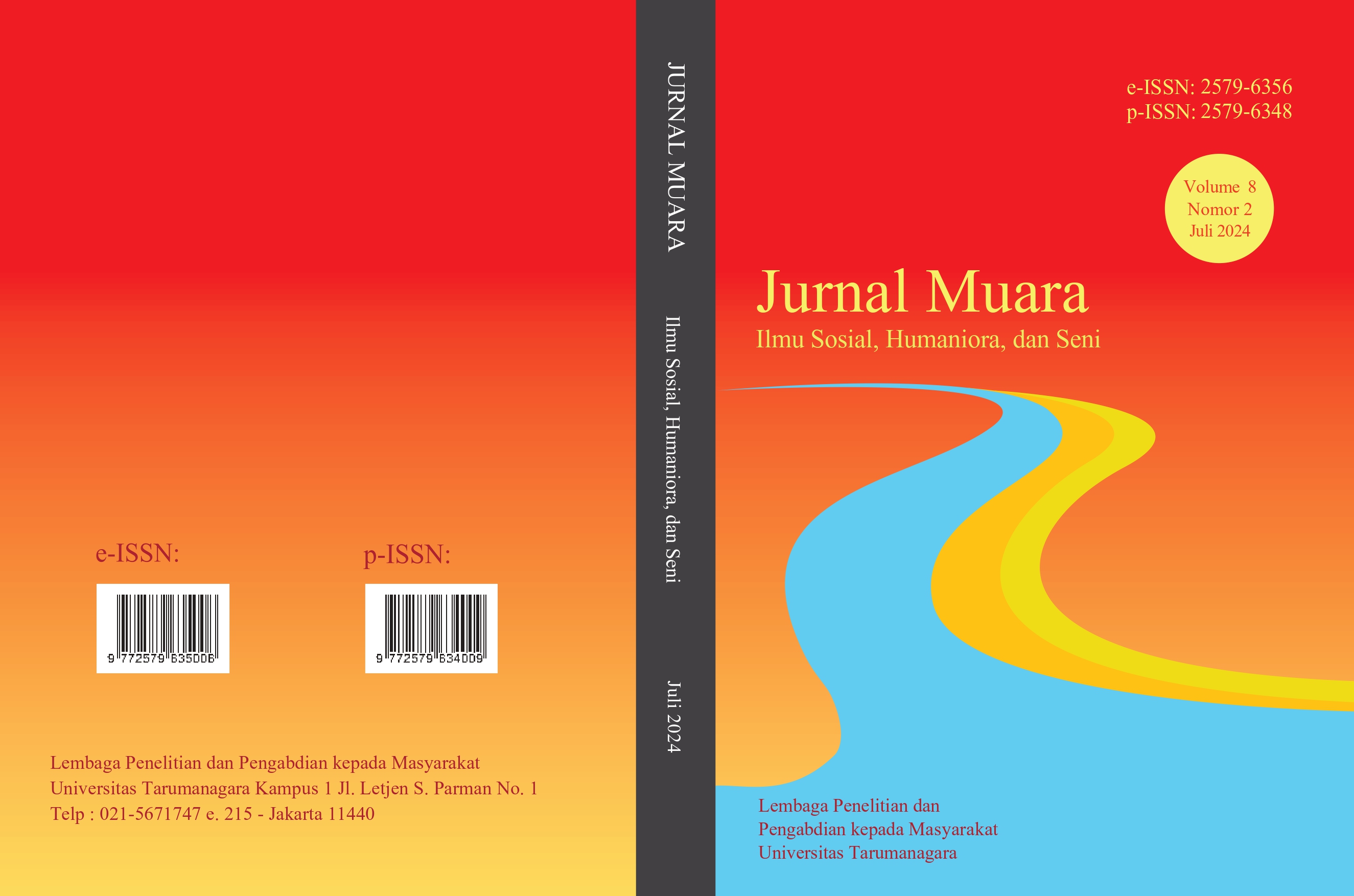PARENTING STYLES PADA ORANG TUA YANG MEMILIKI ANAK BERKEBUTUHAN KHUSUS
Main Article Content
Abstract
Anak berkebutuhan khusus adalah anak yang membutuhkan pendekatan pendidikan yang disesuaikan dengan tantangan belajar dan kebutuhan unik yang dimiliki setiap anak. Dalam konteks ini, penting untuk memberikan perhatian dan dukungan yang tepat agar setiap anak dapat mencapai potensi maksimal. Beberapa penelitian yang telah dilakukan menyebutkan bahwa perkembangan perilaku pada anak berkebutuhan khusus masih kurang optimal. Salah satu faktor yang berpengaruh adalah parenting styles yang diterapkan oleh orang tua. Penelitian ini bertujuan untuk melihat gambaran parenting style pada anak berkebutuhan khusus di Indonesia. Penelitian dilakukan di empat Sekolah Berkebutuhan Khusus di Tangerang, Indonesia. Metode yang digunakan dalam penelitian ini adalah kuantitatif non-eksperimental, dengan teknik pengumpulan data menggunakan teknik purposive sampling melalui kuesioner digital melalui google form dan kuesioner fisik. Partisipan dalam penelitian ini adalah 155 orang tua yang memiliki anak berkebutuhan khusus. Penelitian ini menggunakan instrumen kuesioner Parenting Style Dimension Questionnaire untuk mengukur parenting styles. Hasil uji reliabilitas kuesioner pada dimensi authoritative mempunyai nilai Alpha Cronbach sebesar 0.830, dimensi authoritarian 0.901, dan dimensi permissive 0.620 sehingga instrumen tersebut reliabel untuk digunakan. Hasil dari penelitian ini menunjukkan 93.5% orang tua menerapkan authoritative parenting, 0.6% menerapkan authoritarian parenting, dan 5.8% menerapkan permissive parenting.
Article Details
Section

This work is licensed under a Creative Commons Attribution-NonCommercial-ShareAlike 4.0 International License.
This work is licensed under a Jurnal Muara Ilmu Sosial, Humaniora, dan Seni Creative Commons Attribution-ShareAlike 4.0 International License.References
American Psychological Association (2023). APA dictionary of psychology https://dictionary.apa.org/child-with-special-needs
Baumrind, D. (1991). The influence of parenting style on adolescent competence and substance use. The Journal of Early Adolescence, 11(1), 56–95. https://doi.org/10.1177/0272431691111004
Dyches, T. T., Smith, T. B., Korth, B. B., Roper, S. O., & Mandleco, B. (2012). Positive parenting of children with developmental disabilities: A meta-analysis. Research in Developmental Disabilities, 33(6), 2213–2220. https://doi.org/10.1016/j.ridd.2012.06.015
Garnida, D. (2015). Pengantar Pendidikan Inklusif. Bandung: PT Refika Aditama.
Hazizah, N. (2019). Permissive Parenting Effect toward Emotional Development of Early Childhood. Kolokium Jurnal Pendidikan Luar Sekolah, 7(1), 1–8. https://doi.org/10.24036/kolokium-pls.v7i1.17
Hosokawa, R., & Katsura, T. (2018). Role of Parenting Style in Children’s Behavioral Problems through the Transition from Preschool to Elementary School According to Gender in Japan. International Journal of Environmental Research and Public Health, 16(1), 21. https://doi.org/10.3390/ijerph16010021
Hutchison, L., Feder, M., Abar, B., & Winsler, A. (2016). Relations between Parenting Stress, Parenting Style, and Child Executive Functioning for Children with ADHD or Autism. Journal of Child and Family Studies, 25(12), 3644–3656. https://doi.org/10.1007/s10826-016-0518-2
Johansen, E. R., Nielsen, H. S., & Verner, M. (2020). Long‐Term Consequences of Early Parenthood. Journal of Marriage and Family, 82(4), 1286–1303. https://doi.org/10.1111/jomf.12634
Luo, Y., Chen, F., Zhang, X., Zhang, Y., Zhang, Q., Li, Y., Zhou, Q., & Wang, Y. (2021). Profiles of maternal and paternal parenting styles in Chinese families: Relations to preschoolers’ psychological adjustment. Children and Youth Services Review, 121, 105787. https://doi.org/10.1016/j.childyouth.2020.105787
Kim, Y., Calzada, E. J., Barajas-Gonzalez, R. G., Huang, K.-Y., Brotman, L. M., Castro, A., & Pichardo, C. (2018). The role of authoritative and authoritarian parenting in the early academic achievement of Latino students. Journal of Educational Psychology, 110(1), 119–132. https://doi.org/10.1037/edu0000192
Marlina, M. (2015). Asesmen Anak Berkebutuhan Khusus: Pendekatan Psikoedukasional
Marlina (2015) Asesmen Anak Berkebutuhan Khusus: Pendekatan Psikoedukasional Edisi Revisi. In: Asesmen Anak Berkebutuhan Khusus: Pendekatan Psikoedukasional. UNP Press, Padang, pp. 1-246. ISBN 978-979-8587-68-9
Masuda, R., Lanier, P., & Hashimoto, H. (2019). The Association between Paternal Job Stress and Maternal Child Corporal Punishment: Evidence from a Population-Based Survey in Metropolitan Japan. Journal of Family Violence, 34(2), 119–126. https://doi.org/10.1007/s10896-018-0005-1
Meral, B. F., Wehmeyer, M. L., Palmer, S. B., Ruh, A. B., & Yilmaz, E. (2023). Parenting Styles and Practices in Enhancing Self-Determination of Children With Intellectual and Developmental Disabilities. American journal on intellectual and developmental disabilities, 128(4), 282–301. P-6 https://doi.org/10.1352/1944-7558-128.4.282
Papalia, Diane E.; Feldman, Ruth Duskin; Olds, Sally Wendkos. (2008.). Human development (psikologi perkembangan) / Diane E. Papalia, Sally Wendkos Olds, Ruth Duskin Feldman ; dialih bahasakan oleh A.K. Anwar. Jakarta :: Kencana,.
Papalia, D., E., Feldman, R., D., & Martorell, G. (2012). Experience human
development. (12 ed.). NY : McGraw Hill.
Papalia, D. E., & Martorell, G. (2023). Experience human development (Fifteenth edition). McGraw Hill Education
Perry-Jenkins, M., Laws, H. B., Sayer, A., & Newkirk, K. (2020). Parents’ work and children’s development: A longitudinal investigation of working-class families. Journal of Family Psychology, 34(3), 257–268. https://doi.org/10.1037/fam0000580
Purwanto, N. (2011). Psikologi Pendidikan. CV. Remadja Karya. Qiu, T. (2022). A Systematic Review of Different Parenting Styles Relate to Different Outcomes in ADHD Offspring. Advances in Social Science, Education and Humanities Research. https://doi.org/10.2991/assehr.k.220504.163
Qiu, T. (2022). A Systematic Review of Different Parenting Styles Relate to Different Outcomes in ADHD Offspring. Advances in Social Science, Education and Humanities Research. https://doi.org/10.2991/assehr.k.220504.163
Raya, A. F., Ruiz-Olivares, R., Pino, J., & Herruzo, J. (2013). Parenting Style and Parenting Practices in Disabled Children and its Relationship with Academic Competence and Behaviour Problems. Procedia - Social and Behavioral Sciences, 89, 702–709. https://doi.org/10.1016/j.sbspro.2013.08.918
Reitman, D., Rhode, P.C., Hupp, S.D.A. et al. Development and Validation of the Parental Authority Questionnaire – Revised. Journal of Psychopathology and Behavioral Assessment 24, 119–127 (2002). https://doi.org/10.1023/A:1015344909518
Purnama, S., Wibowo, A., Narmaditya, B. S., Fitriyah, Q. F., & Aziz, H. (2022). Do parenting styles and religious beliefs matter for child behavioral problem? The mediating role of digital literacy. Heliyon, 8(6), e09788. https://doi.org/10.1016/j.heliyon.2022.e09788
Vess, M., & Maffly-Kipp, J. (2022). Parenting Practices and Authenticity in Mothers and Fathers. Sex Roles, 87(9–10), 487–497. https://doi.org/10.1007/s11199-022-01330-0
Widadi, S. Y., & Rahman, R. (2016). Gambaran Pola Asuh Orang Tua Pada Anak Berkebutuhan Khusus di SLBN-B Kabupaten Garut. Jurnal Medika Cendikia, 3(02), 24-31.
Verawaty, & Izzati. (2020). Hubungan pemberian reward terhadap perilaku disiplin anak usia dini. Jurnal Pendidikan Tambusai, 4(2), 1278–1287
Wijaya, S., Supena, A., & Yufiarti. (2023). Implementasi Program Pendidikan Inklusi Pada Sekolah Dasar di Kota Serang. Jurnal Educatio FKIP UNMA, 9(1), 347–357. https://doi.org/10.31949/educatio.v9i1.4592
